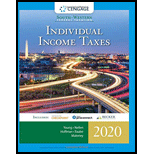
Individual Income Taxes
43rd Edition
ISBN: 9780357109731
Author: Hoffman
Publisher: CENGAGE LEARNING - CONSIGNMENT
expand_more
expand_more
format_list_bulleted
Question
Chapter 2, Problem 24DQ
a.
To determine
Discuss the significance of the tax payer’s issue.
b.
To determine
Discuss the significance of the tax payer’s issue.
c.
To determine
Discuss the significance of the tax payer’s issue.
d.
To determine
Discuss the significance of the tax payer’s issue.
e.
To determine
Discuss the significance of the tax payer’s issue.
f.
To determine
Discuss the significance of the tax payer’s issue.
Expert Solution & Answer
Want to see the full answer?
Check out a sample textbook solution
Students have asked these similar questions
What is the return on assets on this general accounting question?
Richard has the following potential liabilities:
William, a former employee, has sued Richard for $880,000. Richard contacted his attorney, and the case is believed to be
frivolous.
Carter sued Richard for an undisclosed amount for a class action lawsuit. Richard thinks it's frivolous, but his attorneys
indicate a loss is probable for $88,000.
Charles sued Richard because he slipped outside of Richard's store. The claim is $264,000 and Richard is certain he will lose
the case but believes Charles will settle. The attorneys agree and based on conversations with Charles's attorneys, have stated
that it is remote the claim will be settled for $255,200. Charles's attorneys indicated he would be willing to accept either cash
of $242,000 or shares of Richard's closely-held common stock currently valued at $233,200. Richard would prefer not to
settle in cash.
Richard is suing William for $264,000 because William is in violation of a non-compete agreement he has with Richard.
Richard is…
Need answer the financial accounting question not use ai
Chapter 2 Solutions
Individual Income Taxes
Ch. 2 - A large part of tax research consists of...Ch. 2 - Why do taxpayers often have more than one...Ch. 2 - Prob. 3DQCh. 2 - Prob. 4DQCh. 2 - Prob. 5DQCh. 2 - Prob. 6DQCh. 2 - Rank the following items from the lowest to...Ch. 2 - Prob. 8DQCh. 2 - Prob. 9DQCh. 2 - Prob. 10DQ
Ch. 2 - Prob. 11DQCh. 2 - Prob. 12DQCh. 2 - Sanjay receives a 90-day letter after his...Ch. 2 - Prob. 14DQCh. 2 - Prob. 15DQCh. 2 - Prob. 16DQCh. 2 - Prob. 17DQCh. 2 - Prob. 18DQCh. 2 - Prob. 19DQCh. 2 - Prob. 20DQCh. 2 - Prob. 21DQCh. 2 - Prob. 22DQCh. 2 - Prob. 23DQCh. 2 - Prob. 24DQCh. 2 - Prob. 25DQCh. 2 - Prob. 26DQCh. 2 - Prob. 27DQCh. 2 - Prob. 28DQCh. 2 - Prob. 29DQCh. 2 - Prob. 30DQCh. 2 - Prob. 31DQCh. 2 - For her tax class, Yvonne must prepare a research...Ch. 2 - Prob. 33DQCh. 2 - Prob. 34DQCh. 2 - Prob. 35DQCh. 2 - Prob. 36DQCh. 2 - Prob. 37PCh. 2 - Prob. 38PCh. 2 - Prob. 39PCh. 2 - Prob. 40PCh. 2 - Prob. 41PCh. 2 - Using the legend provided, classify each of the...Ch. 2 - Prob. 43PCh. 2 - Prob. 1RPCh. 2 - Prob. 2RPCh. 2 - When Oprah gave away Pontiac G6 sedans to her TV...Ch. 2 - Prob. 4RPCh. 2 - (1) Go to taxalmanac.org, and use the website to...
Knowledge Booster
Similar questions
- Give me true answer this financial accounting questionarrow_forwardI cannot figure out the account of "Goodwill" or "APIC from Pushdown Accounting." I thought APIC should be $285,000, but it didn't work for some reason. And I didn't know we had goodwill, but we do, and I can't figure out how to get the correct answer. I tried $350,000 for APIC, but that also doesn't work, and I am at a loss of what to do next. Please explain as clearly as possible how to do Goodwill and the APIC from Pushdown Accounting. Thanks so much! :)arrow_forwardNonearrow_forward
arrow_back_ios
SEE MORE QUESTIONS
arrow_forward_ios
Recommended textbooks for you
 Individual Income TaxesAccountingISBN:9780357109731Author:HoffmanPublisher:CENGAGE LEARNING - CONSIGNMENT
Individual Income TaxesAccountingISBN:9780357109731Author:HoffmanPublisher:CENGAGE LEARNING - CONSIGNMENT




Individual Income Taxes
Accounting
ISBN:9780357109731
Author:Hoffman
Publisher:CENGAGE LEARNING - CONSIGNMENT

